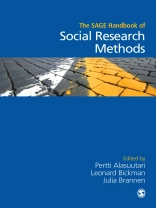The SAGE Handbook of Social Research Methods is a must for every social-science researcher. It charts the new and evolving terrain of social research methodology, covering qualitative, quantitative and mixed methods in one volume.
The Handbook includes chapters on each phase of the research process: research design, methods of data collection, and the processes of analyzing and interpreting data. The volume maintains that there is much more to research than learning skills and techniques; methodology involves the fit between theory, research questions research design and analysis. The book also includes several chapters that describe historical and current directions in social research, debating crucial subjects such as qualitative versus quantitative paradigms, how to judge the credibility of types of research, and the increasingly topical issue of research ethics.
The Handbook serves as an invaluable resource for approaching research with an open mind. This volume maps the field of social research methods using an approach that will prove valuable for both students and researchers.
Spis treści
Social Research in Changing Social Conditions
PART ONE: DIRECTIONS IN SOCIAL RESEARCH
The End of the Paradigm Wars? – Alan Bryman
The History of Social Research Methods – Marja Alastalo
Assessing Validity in Social Research – Martyn Hammersley
Ethnography and Audience – Karen Armstrong
Social Research and Social Practice in Post-Positivist Society – Pekka Sulkunen
From Questions of Methods to Epistemological Issues – Ann Nilsen
The Case of Biographical Research
Research Ethics in Social Science – Celia B. Fisher and Andrea E. Anushko
PART TWO: RESEARCH DESIGNS
The Core Analytics of Randomized Experiments for Social Research – H S Bloom
Better Quasi-Experimental Practice – Thomas D. Cook and Vivian Wong
Sample Size Planning with Applications to Multiple Regression – Ken Kelly and Scott E. Maxwell
Power and Accuracy for Omnibus and Targeted Effects
Re-Conceptualizing Generalization in Qualitative Research – Giampietro Gobo
Old Issues in a New Frame
Case Study in Social Research – Linda Mabry
Longitudinal and Panel Studies – Janet Holland, Rachel Thomson and Jane Elliott
Comparative and Cross-National Designs – David de Vaus
PART THREE: DATA COLLECTION AND FIELDWORK
Modern Measurement in the Social Sciences – James A. Bovaird and Susan E. Embretson
Natural and Contrived Data – Susan Speer
Self Administered Questionnaires and Standardized Interviews – Edith de Leeuw
Qualitative Interviewing and Feminist Research – Andrea Doucet and Natasha Mautner
Biographical Methods – Joanna Bornat
Focus Groups – Janet Smithson
PART FOUR: TYPES OF ANALYSIS AND INTERPRETATION OF EVIDENCE
An Introduction to the Multi Level Model for Change – Suzanne E. Graham, Judith D. Singer and John B. Willett
Latent Variable Models of Social Research Data – Rick H. Hoyle
Equating Groups – Stephen West and Felix Thoemmes
Discourse Analysis and Conversation Analysis – Charles Antaki
Analyzing Narratives and Story-Telling – Matti Hyvärinen
Reconstructing Grounded Theory – Kathy Charmaz
Documents and Action – Lindsay Prior
Video and the Analysis of Work and Interaction – Christian Heath and Paul Luff
Secondary Analysis of Qualitative Data – Janet Heaton
Secondary Analysis of Quantitative Data Sources – Angela Dale, Jo Wathan and Vanessa Wiggins
Conducting a Meta Analysis – Erika A. Patall and Harris Cooper
Synergy and Synthesis – Jane Fielding and Nigel Fielding
Integrating Qualitative and Quantitative Data
The Analytic Integration of Qualitative Data Sources – Ann Cronin, Victoria D. Alexander, Jane Fielding, Jo Moran-Ellis and Hilary Thomas
Combining Different Types for Quantitative Analysis – Max Bergman
Writing and Presenting Social Research – Amir Marvasti
O autorze
Julia Brannen is Emerita Professor of the Sociology of the Family at Thomas Coram Research Unit, UCL Institute of Education. Her research interests include families and intergenerational relations, the work-family interface and food in families. She has a special interest in methodology including mixed methods, comparative cross-national research, biographical approaches. Her most recent book is Social Research Matters (2019).












